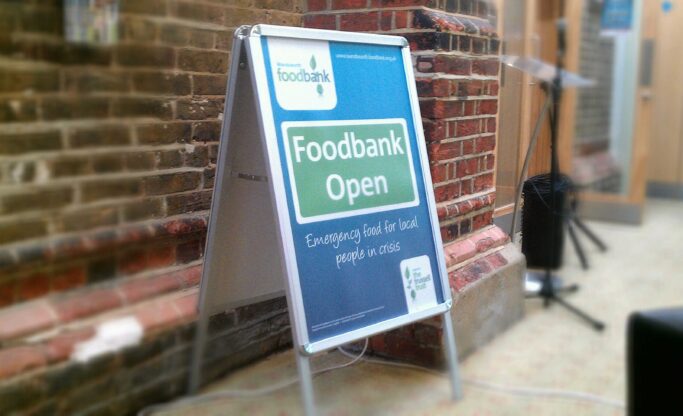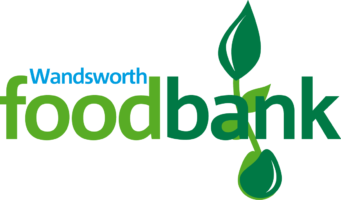News
10 years ago, we opened our doors
10th May 2023
Share this: facebook link twitter link linkedin link

Today ten years ago, Wandsworth Foodbank opened its doors to support local residents in hardship. In that first year, we provided 2,646 emergency food parcels to local people – four in ten of which were for children.
Fast forward to now, and last year we provided 11,145 emergency food parcels – a 400 per cent increase on 2013/14. We’ve needed to increase the number of our food bank welcome centres across Wandsworth Borough from four to seven; our Foodbank Advice Project partnership with Citizens Advice Wandsworth has grown from one adviser to five; and now one in four food bank referrals are for home deliveries to people who cannot get to our welcome centres because of disability or ill-health.
In our research for that first year, a referrer to our food bank wrote:
“Foodbanks offer a lifeline of support to families living in poverty. But the issues relating to why families need food banks needs to be addressed, as no child living in this country should go to bed hungry, cold and scared at night.”
How right they were. But sadly, rather than issues being addressed, the next years saw a number of political choices, under the umbrella of welfare reform and austerity, that weakened the safety net of our social security system, froze benefit payments, increased hardship, and drove up numbers of people who needed to use food banks across the UK because their income didn’t cover essential costs.
People with disabilities have been particularly hardest hit, and are now one of the groups most at risk of needing to use a food bank like ours. There were many warnings along the way, not least from Professor Philip Alston, United Nations Special Rapporteur on extreme poverty and human rights, whose 2018 report on the UK said:
“Nearly half of those in poverty, 6.9 million people, are from families in which someone has a disability. People with disabilities are more likely to be in poverty, and are more likely to be unemployed, in insecure employment, or economically inactive. They have also been some of the hardest hit from austerity measures. As a result of changes to benefits and taxes since 2010, some families with disabilities are projected to lose £11,000 on average by 2021/22, more than 30% of their annual net income.”
Ten years from the day we opened, we’re desperate for change. We’re so glad to be able to help local people and families in hardship, but we wish food banks were not needed in the UK. Sadly there’s little sign that poverty and hardship will decrease in the foreseeable future, at least without better government policies and provision for citizens facing difficult times.
Cost of living pressures and soaring inflation continue to impact many people, but especially those on the lowest incomes in our community. It’s widely acknowledged that benefits like Universal Credit simply aren’t enough to cover the cost of essentials, and we strongly support the call from Trussell Trust and Joseph Rowntree Foundation for an Essentials Guarantee – where the government would set Universal Credit rates based on the actual cost of essentials, rather than an arbitrarily chosen amount, currently £85 per week for a single adult. Could you live and breathe on that amount a week?
Other organisations are raising similar concerns, and last November we were pleased to host members of the Greater London Authority’s Economy Committee at St Mark’s Church, Battersea Rise, where we’re based. We were so grateful to local people who’d used our food bank who joined this meeting, and who the committee recognised ‘showed grace and courage in sharing their stories’. The resulting recently published GLA report, Food Insecurity in London, provides more evidence of the drivers of poverty and food insecurity, and what needs to change. The Committee wrote:
“During our visit to Wandsworth Foodbank, it was apparent how embedded food banks have become in local communities. Several people we spoke to told us that it was ‘more than just a food bank’. There is no doubt that food banks – including the brilliant staff and volunteers we met in Wandsworth – are playing a vital role in supporting people in real need. But we should not have to rely on food banks to act as a safety net in this way.
“Everyone we spoke to was clear that food insecurity is a symptom of wider financial insecurity and poverty. Guests at the Committee’s meeting highlighted a range of problems, related to a lack of job security, low pay, problems with Universal Credit and insufficient advice services.”
We hope that within the next ten years, our food bank will no longer be needed. We hope that everyone in our community and across the UK will have enough income for essential costs, whether through a strong social security safety net or secure well-paid work.
In the meantime we’ll continue to work for change, and to support local people and families at some of the most difficult times of their lives. We’re so grateful to hundreds of amazing local volunteers who have helped since 2013, driven by a shared vision of justice and compassion, without whom none of what we do would be possible.
We’re so thankful for each local person who’s used our food bank and contributed to our research and advocacy for change. We’re grateful to the nearly 300 agencies and organisations across the borough who refer people in hardship to us, and to our local allies who’ve spoken up about issues of poverty and inequality with us.
And we are so grateful to each person, family, church, faith group and business who has given what they can to help local people in hardship through Wandsworth Foodbank.
Thank you so much.


